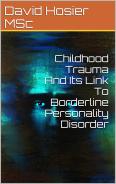Tags
The Five Main Routes Through Which Childhood Trauma Harms Us-Part 2
This post follows on from The Five Main Routes Through Which Childhood Trauma Harms Us – Part 1. Click here to read it.
We have already looked at the emotional route (item 1 on the list of the five routes – see Part 1) through which childhood trauma may harm us in Part 1. In this post, I want to turn to the other four routes through which childhood trauma can harm us; these are :
2) THE BEHAVIOURAL ROUTE
3) THE COGNITIVE ROUTE
4) THE SOCIAL ROUTE
5) THE BIOLOGICAL ROUTE
Let’s look at each of these in turn :
– THE BEHAVIOURAL ROUTE : Our adverse childhood experiences (eg rejection, betrayal, abuse) often lead us to develop counter-productive coping mechanisms to attempt to deal with our distress in adult life; in turn, these dysfunctional coping mechanisms are likely to adversely impact on our physical health; examples include :
– smoking
– high risk sexual activity (ie unprotected, promiscuous sex)
Essentially, we adopt these behaviours in order to psychologically dissociate from our all too painful reality (click here to read my post on dissociation).
Unfortunately, in addition to the fact that these behaviours can lead to physical illness, our reliance upon them also PREVENTS US FROM LEARNING MORE EFFECTIVE COPING STRATEGIES.
– THE COGNITIVE ROUTE : The term ‘cognitive’ relates to how we think about things; for example, the attitudes and beliefs which, in large part, determine our day-to-day behaviour. As I have written about fairly extensively in other posts, the experience of childhood trauma often results in us developing a cognitive negative bias towards ;
– ourselves
– other people
– the world in general
This three-way despairing outlook has been termed ‘THE NEGATIVE COGNITIVE TRIAD’ and is one of the main hallmarks of clinical depression. We tend, for example, to (completely erroneously) blame ourselves for the trauma that we suffered and this prevents us from developing good self-esteem or a cohesive and positive self-identity (eg Kralik, 2005).
If, as children, we were in a more or less perpetual state of stress, it is likely that we frequently experienced the ‘fight/flight response’ as a reaction to frightening stimuli. If this occurred frequently enough, and over a long enough period, such a response may well have become DEEPLY INGRAINED INTO OUR PERSONALITY – we become conditioned to respond in this way (beyond our conscious control) whenever we feel threatened.
Therefore, as an adult, we may, for example, frequently react with extreme anger which seems, to an objective observer, as both excessive and inappropriate. However, such rage occurs because the (even very small) threats we experience in adulthood remind us (usually on an unconscious level) of the threats we experienced as children – thus the response which was conditioned into us over long years of suffering in childhood is triggered.
– THE SOCIAL ROUTE : We have seen in previous posts how childhood trauma can lead us to experience extreme difficulties in relation to our personal relationships in adult life (eg – click here). As a result, we may, as adults, find we have little social support – in turn, a lack of social support and close personal relationships has been shown (eg Draper et al., 2007) to be associated with poor physical and mental health. Indeed, Tucker (1999) carried out research showing that our social environment is more important in relation to our mental health than our physical environment.
– THE BIOLOGICAL ROUTE : Chronic stress in childhood can adversely affect our neurological development, and, therefore, we are more likely to develop neuropsychiatric conditions as adults (click here to read a previous post I wrote on this).
I hope you have found this post interesting.
Best wishes, David Hosier BSc Hons; MSc; PGDE(FAHE).




